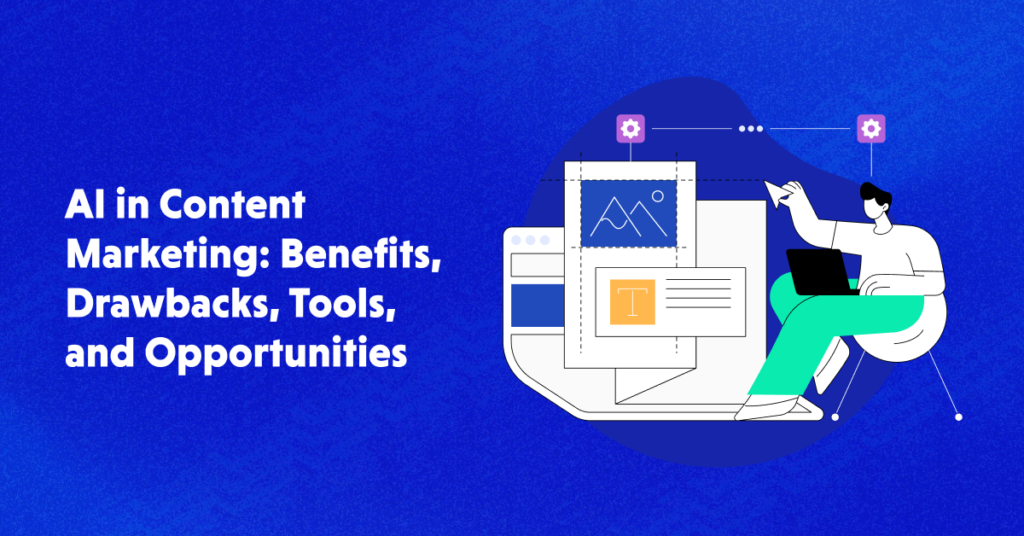
Artificial intelligence is shaking up businesses in a way the world has never seen before — thanks to groundbreaking technological advances. Like most business spheres, it has shaped content marketing to a great extent.
Dozens of grueling content marketing tasks that used to be operated manually have become automated these days. That said, AI is still evolving and will leave a bigger impact in the near future.
No matter whether it’s keyword research, competitor analysis, content writing, or sharing, AI has simplified each of these tasks.
As per a survey by Influencer Marketing Hub, 61.4% of marketers have leveraged AI in their marketing activities. On top of that, 44.4% have tapped into AI for content production. These are some staggering numbers.
But we also can’t forget that AI has some drawbacks alongside immense perks. This blog will shed light on AI’s benefits, drawbacks, tools, and opportunities, specifically in content marketing. Keep reading to find out more.
Disclaimer: This is a guest blog submitted by Mohd Wasim Choudhury, Senior Creative Content Writer at XpeedStudio
AI in Content Marketing – Explained
Businesses always hunt for new ways to speed up their content marketing process. This process encompasses content research, creation, curation, and distribution. Unsurprisingly, the entire process takes ample time to achieve perfection if done manually.
This is where introducing AI in content marketing comes into play. With AI, content marketing can be automated both wholly and partially. You can conduct massive data analysis, generate personalized marketing copies, and track users’ activities in minutes, all thanks to AI.
But that doesn’t mean that you should hand over all your content marketing tasks to AI tools firing your human content writers and marketers. It will surely backfire!
Instead, you should set up your marketing team & these AI tools in harmony for the best results. This is because AI-produced content always requires human intervention for a perfect delivery. With proper human input and strategy, AI content tools can deliver masterpieces.
The Evolution of AI in Content Marketing
The evolution of AI in content marketing has been quite remarkable. Early AI content tools used Natural Language Processing (NLP) for tasks like keyword analysis, while the introduction of GPT-3 brought advanced content generation capabilities.
AI now enables personalized content creation based on audience segmentation and enhances content optimization for better SEO. Additionally, AI-driven analytics provides valuable insights for data-based decision-making.
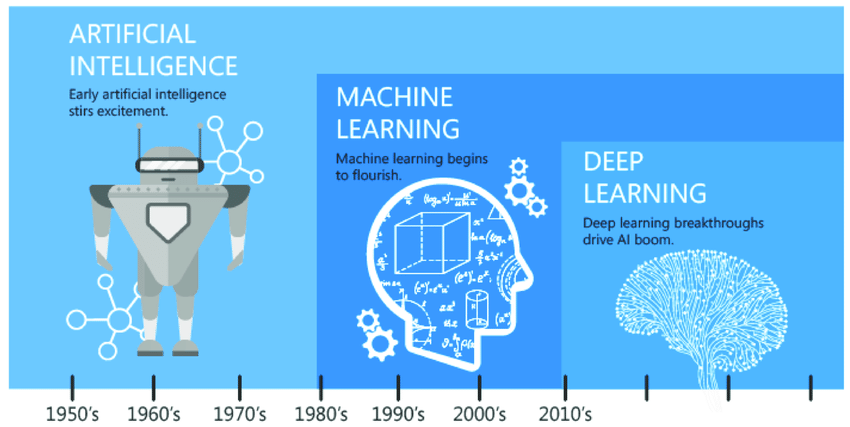
Source: ResearchGate
AI powered data & processing revolutionized content analytics, providing actionable insights on performance, customer behavior, and market trends. Real-time data empowers marketers to make informed decisions for more effective content strategies.
As AI continues to advance, businesses can harness its power to engage audiences effectively, but a balance between AI automation and human creativity remains crucial to maintain authenticity in content.
Does AI-Generated Content Matter for Google?
Back in April 2022, Google’s search advocate John Mueller said in a YouTube interview that AI-generated content is spam and against Google’s guidelines. But in February 2023, Google made a U-turn on its view about AI-generated content.
Google, in the latest update, stated that not all AI content is spam; rather, sometimes, it serves well and doesn’t always manipulate search rankings.
In a nutshell, Google only cares if your content is useful for readers and not if it’s machine-generated or human-written.
As a matter of fact, Google always prioritizes content that demonstrates expertise, experience, authoritativeness, and trustworthiness (E-E-A-T). It advises publishers to focus on producing original, top-quality, and people-first content to pack a punch in search results.
Here are some reasons why Google doesn’t bother whether a piece is AI-generated:
- Google can differentiate between standard and substandard content, with many of its search algorithms working behind the scenes.
- Google can tackle the flood of poor content with its strong defense system. It can even detect spammy content with its platform i.e., SpamBrain.
- Google knows AI content can assist writers in producing top-notch content.
AI Will Replace Human Content Writers: Fact or Myth?
With the advent and availability of AI writing tools, including ChatGPT, a common question making the rounds is, “Will AI replace human writers?” Before I shed light on the point, let me present to you what Sam Johnson, the Editor-In-Chief of Otter PR, has to say about this.
Sam Johnson believes AI technology has become sophisticated over the past several decades. However, it still lacks critical abilities, features, and skills that human writers can easily replicate while working with clients but not a machine.
As a matter of fact, it’s obvious that AI has made commendable strides in recent years. Leveraging advanced language models, AI writing tools can generate an outline in seconds and even an entire blog post in minutes.
To generate these pieces of content, AI content tools explore and access a considerable amount of data online crafted by human writers. They utilize these human-written content pieces and produce functional content on the given topics.
However, I have already mentioned above that AI tools have some limitations. They can’t pick up a subject’s context and fail to spark emotion in readers’ minds.
To build trust with the readers, sometimes it’s crucial to give a personal touch based on human experiences and emotions. AI tools cannot replicate that as well, whereas human writers can do that emphatically.
Let’s take a look at 2 intros on “Best SEO Plugins for WordPress”, produced by ChatGPT and a human writer in the screenshots below:
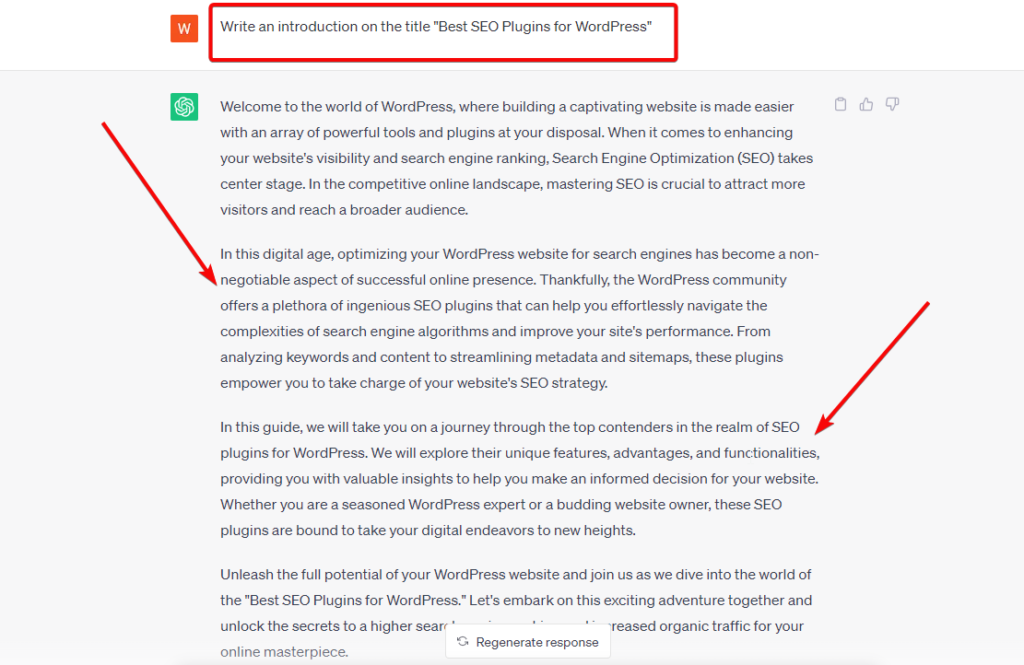
The above intro generated by ChatGPT is good and functional, no doubt. But it’s too long, generic, and doesn’t blow away readers.
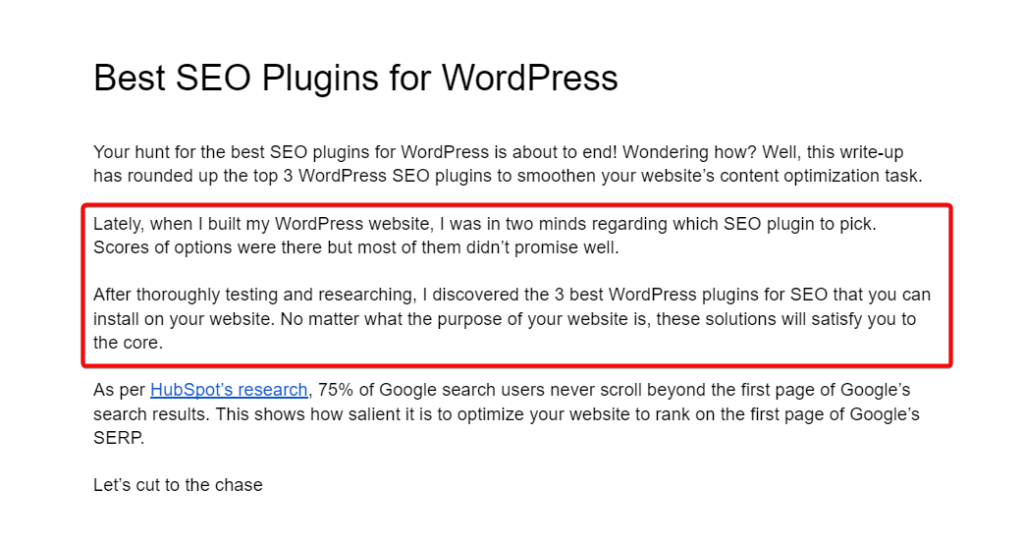
Contrarily, the intro generated by a human writer shown above isn’t just short but also shares a personal experience that compels as well as builds trust with readers.
Based on these shortcomings of AI tools, it can be said undoubtedly that AI wouldn’t replace human writers, at least for now. Instead, it will assist human writers in speeding up content creation and improving efficiency.
AI Content Marketing Perks & Benefits
As mentioned above, AI has the power to undertake scores of content marketing tasks. Not only can it execute these tasks, but also expedite the process letting you focus on more productive tasks. Let’s take a closer look at some of the key benefits AI serves in content marketing:
Develop Personalized Content
Your prospects and clients don’t want irrelevant content in their emails and will likely overlook your messages and switch to a different brand if your content doesn’t meet their needs. Thankfully, AI comes into play when producing personalized content.
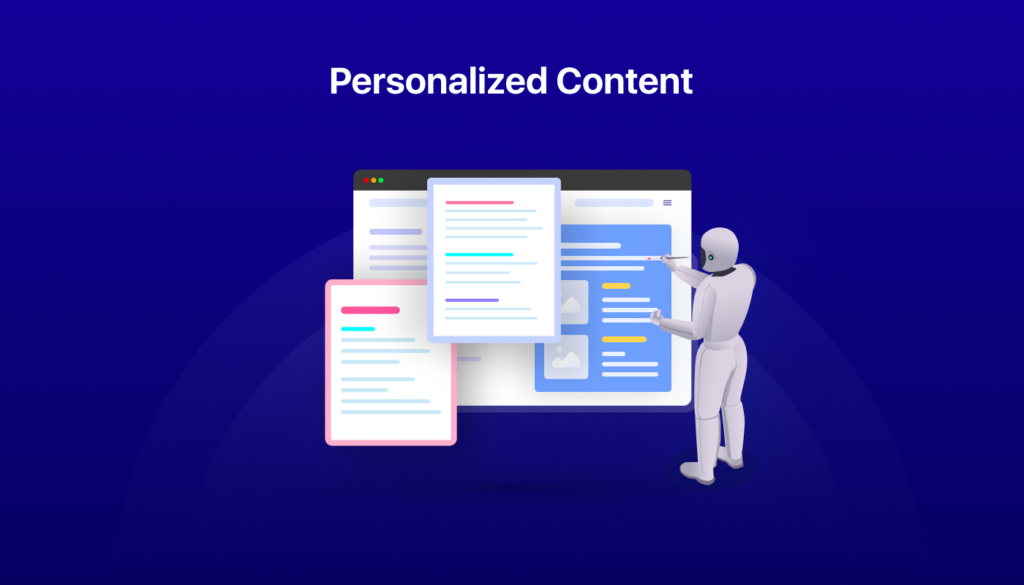
With AI, you can get hold of your audience segments easily and gather useful data about each client based on their interests, preferences, purchase history, demographics, etc. All this information will help you develop tailored content for your targeted audience.
Additionally, you can prepare customized messages and recommendations for your clients by leveraging AI marketing tools.
Streamlined and Speedy Content Creation
Time is money; we all know that. And you can save loads on both by leveraging AI in content marketing. Apart from carrying out mundane tasks like post-scheduling and analytics tracking, AI-powered tools can also generate a whole content piece.
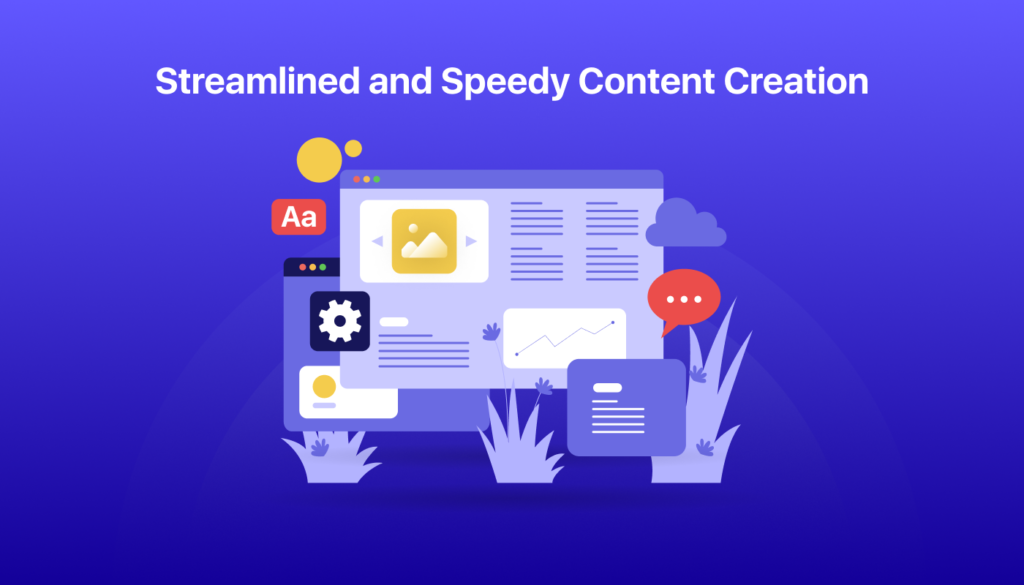
Today’s AI technologies leverage NLP and GPT-3 to produce top-notch content, requiring just a few editorial tweaks for a human touch. And that’s also in a matter of seconds or minutes, depending on the content type. Definitely, you can’t tap into the content straightaway. Instead, you need human writers and marketers to polish it.
Content Optimization & Strategy Development
Content creation isn’t the end of the road. You must optimize your content for higher SERP rankings and to reach your target audience organically. AI optimization tools have the magical powers for that too, as they keep a check on your content and add useful keywords throughout your piece.
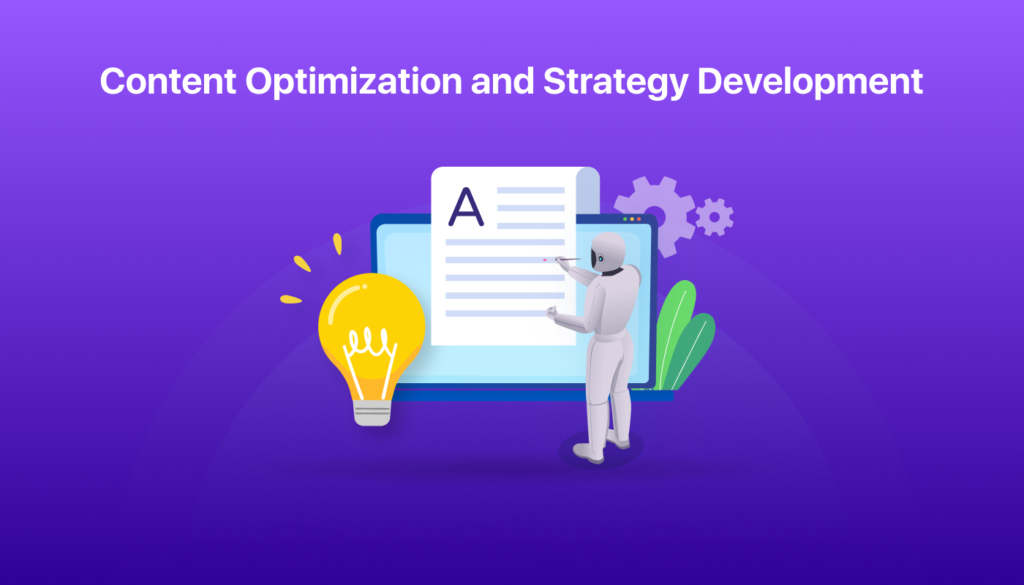
With tools like MarketMuse, GetGenie AI, SurferSEO, Clearscope, etc, you can get relevant keyword suggestions, ideal word count, number of headings, subheadings, internal links, and external links to use.
Some of these tools also help in developing content strategy, tracking keyword placement, readability, content score, etc., to help you craft optimized content. Additionally, they can suggest the right time and place to publish your content for maximum visibility.
Provide Automated Insights
It’s crucial for businesses to pick up customer behavior and ongoing trends as they help in effective decision-making. AI helps you scrape real-time customer behavior and other relevant pieces of data from a large data set.
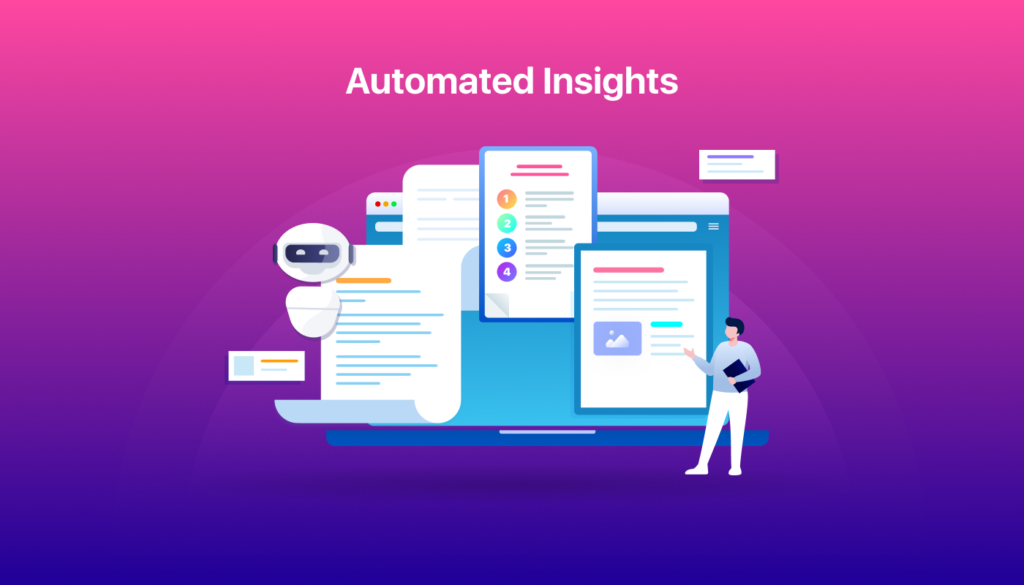
With abundant data, you can make confident decisions about your marketing campaigns, product development, pricing strategy, priority setting, and so forth.
Enable Cost-Cutting
Every business owner thinks about cost-cutting, and so should you. You can reduce your expenses related to manual labor to a great extent by automating some of the repetitive and non-creative content marketing tasks.
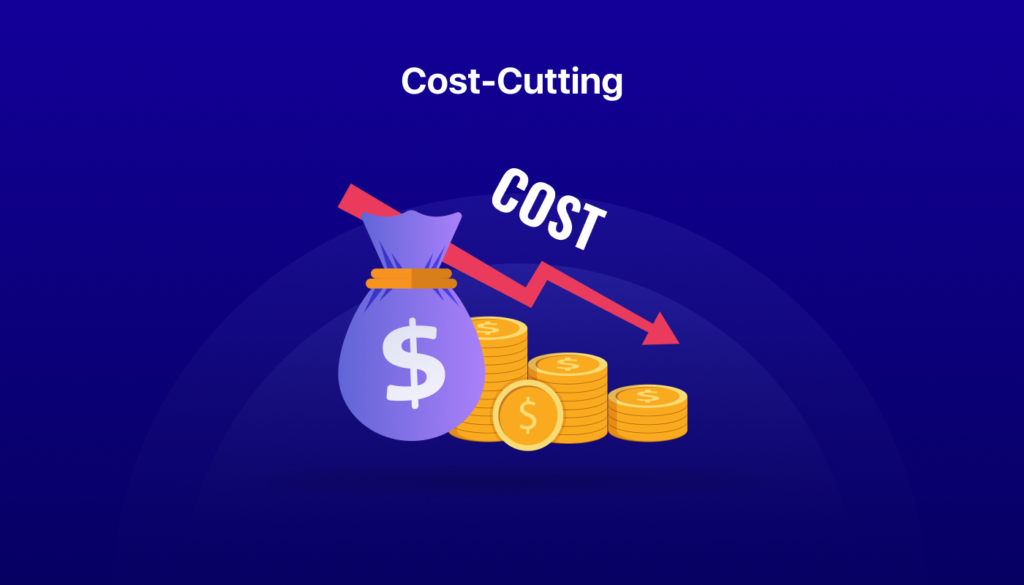
The good thing is that AI executes all these tasks in a flash which human pros would take hours to accomplish. So, that’s the icing on the cake of AI content marketing!
AI Content Marketing Drawbacks
Although content marketing with AI can yield scores of benefits, it has some downsides too. And you should keep those in mind before leveraging AI in your content marketing.
Over-Reliance on Algorithms
AI fails to determine a subject’s tone, depth, and context, causing increased dependency on algorithms like stuffing text with keywords. Such practices automatically devalue your content and make it look machine-generated rather than human. And the search engines don’t like that causing problems for your SEO in the process.
Absence of Creativity and Originality
Creative content always packs a punch. But AI fails to produce highly original and creative content since it lacks emotion and empathy. So, you will always need a human touch for creativity in your content.
On top of that, AI generates content by integrating existing content available on the web. So, if you are in need of original content, maybe of a just-launched product, you can’t get it from AI.
In recent times, a bunch of tech companies have launched AI content tools that can generate as well as optimize content. Let’s take a look at some of the prominent AI content marketing tools out there:
1) GetGenie
GetGenie is a top-notch AI SEO & Content tool with a number of content writing and analysis features within it. Available both as a SaaS interface and a WordPress plugin, it’s designed to take over your content planning, writing, and optimization tasks in a flash.
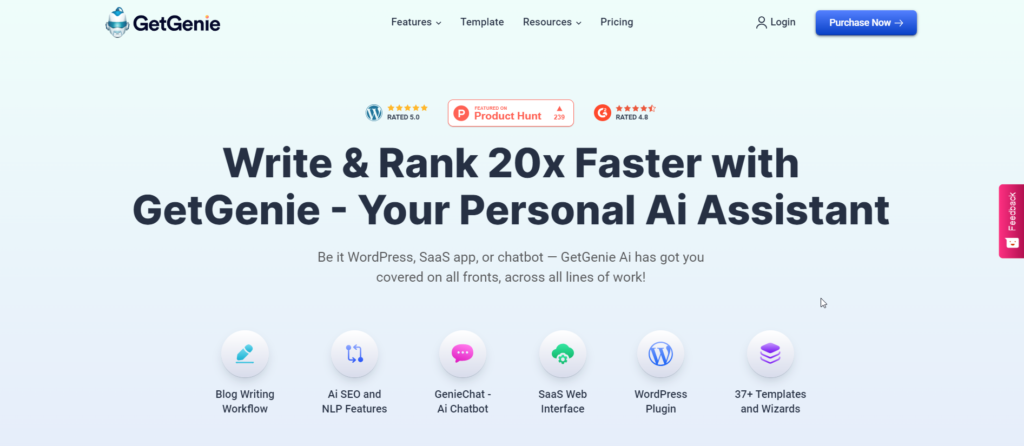
GetGenie boasts 37+ templates aiming to slash your writing efforts and scale up efficiency 20x faster. Whether you need product ad copies, taglines, WooCommerce product descriptions, pros & cons, or even whole blog posts, GetGenie can generate all of them with its premade templates.
Aside from that, its SEO mode helps you conduct keyword research by displaying relevant data sets like keyword search volume, keyword difficulty, etc. You can even execute SERP competitor analysis using GetGenie.
The best part comes in content optimization, as GetGenie suggests NLP keywords and other key metrics, ensuring your blogs rank in the top SERPs. For a better understanding of content quality and optimization, GetGenie shows a content score too.
With its “Genie Mode,” you can generate content through prompts and get an in-depth response in return. Besides, GetGenie recently launched their chatting platform “GenieChat,” which can be instrumental in content marketing too.
2) Jasper
Jasper is available solely as a SaaS AI content creation tool that stands as one of the market leaders globally. It can generate various forms of content, including blog posts, social media copies, YouTube scripts, and ebooks.
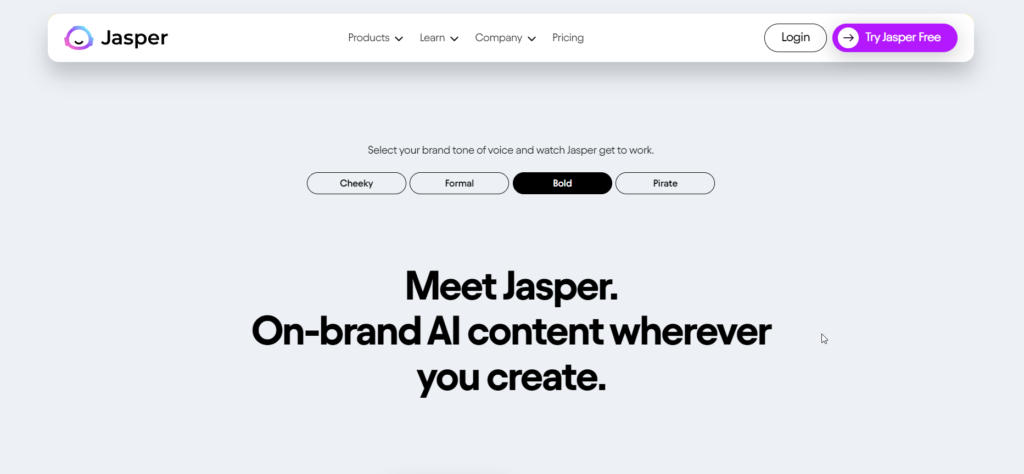
Not just creating content, Jasper also ensures your content is optimized for search engines. It comes with an “SEO Mode” that gives you access to SurferSEO (if you have a SurferSEO account), where you can easily optimize your content.
Moreover, Jasper offers “Boss Mode,” through which you can notch up extra benefits like faster content generation, high-quality output, Grammarly usage, etc.
On top of that, Jasper comes with some blinding features, including 50+ copywriting templates, 29+ language support, and a Google Chrome extension. Like GetGenie, Jasper has also released its chatting platform i.e., Jasper Chat.
3) Writesonic
Another AI content assistant that created a buzz lately is Writesonic. The AI content tool attempts to simplify your content creation process and helps to optimize content for search engines by integrating with SurferSEO.
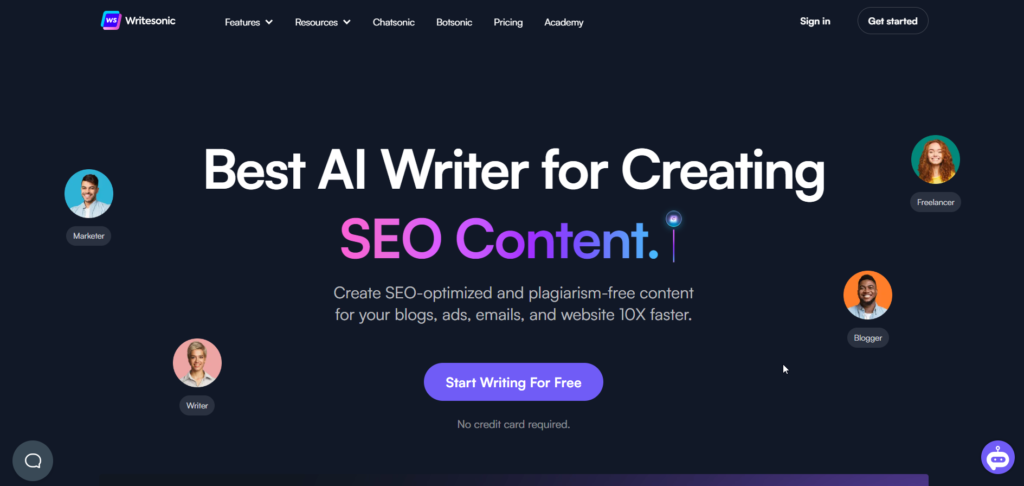
With Writesonic, you can write SEO-friendly content for blog posts, landing pages, essays, Google ads, Facebook ads, Quora answers, etc. Not just that, you can even generate conversion-friendly sales emails.
Writesonic offers 80+ robust AI writing tools and support for 25+ languages which enable you to generate imposing and diverse content. Apart from that, Writesonic recently rolled out their ChatGPT-like chatting platform “Chatsonic,” which can power up your content marketing further.
Barring the above 3 AI content tools, tons of other AI content marketing tools are at your disposal that you can avail of. Some of them include Rytr, Copy.AI, Copymatic, Anyword, Scalenut, Frase, LongShot AI, and Peppertype.ai.
AI Content Marketing Opportunities
As time progresses, artificial intelligence brings new hopes with jaw-dropping advancements in content marketing. From NLP to big data analysis, businesses can benefit a lot from these AI features.
NLP leverages algorithms to pick up the natural language and generate relevant answers based on user input. So, using NLP, you can streamline the customer experience and offer tailored content, serving your customers optimally.
Businesses can also use big data analysis to level up their content marketing efforts. With this AI feature, you can get insights into the preferences and interests of your target audience.
These AI features enable you to develop your content marketing campaigns fruitfully. With predictive analytics, market segmentation, and sentiment analysis tools, you can get hold of the trends in your customer base and tailor your content and messages accordingly. In this way, not only do you expedite your process but also create a marketing impact.
How are Content Creators Leveraging AI Content Tools?
Content creators and marketers have already grasped the utility of AI content tools. Obviously, not all creators and marketers are using these AI tools for the same purpose.
As per a survey of HubSpot, 33% of marketers leveraging AI tap into it to generate ideas and inspiration for their marketing content. In addition, 28% of marketers using AI generate materials like blog posts and emails with AI tools.
Apart from these, some content writers and marketers utilize AI tools to generate blog outlines, conduct keyword & competitor research, get optimization & proofreading suggestions, and also to detect plagiarism in a piece of content.
Global Brands Leveraging AI Content Marketing
Content marketing has become quite easy these days, especially with the touch of AI. Even its effectiveness has mounted due to AI’s unimaginable capabilities. Audience segmentation, content personalization, etc., are some of the wonders AI can execute.
Leading brands across the globe have comprehended this fact and have already begun to avail of AI to supercharge their content marketing. Let’s take a glimpse at the 3 prominent brands tapping into AI content marketing.
1) Dell
Tech giant Dell reaped the fruits of AI in its content marketing efforts. The company has been trying to offer a personalized experience to its prospects and customers for a long time.
They used AI to segment their audience from their massive customer base and to define the product interests of each segment. Also, they leveraged AI to polish their content as well as the images incorporated in emails, boosting the CTRs and conversions.
2) eBay
eBay is an eminent C2C e-commerce brand that constantly aims to boost its customer satisfaction. The company adopted an AI-driven marketing tool called “Phrasee” in 2016 to produce personalized email headlines for its millions of customers worldwide.
For a small-scale e-commerce company, coming up with some effective email headlines is a cakewalk. But for a company of eBay’s scale, crafting catchy and fruitful email subject lines is an uphill task.
Phrasee helped eBay to produce stacks of personalized email headlines for its customer segments based on their interests. With the combination of both natural language algorithms and eBay’s brand voice, the AI tool generated headlines that pack a punch.
3) Chase Bank
Apart from tech and e-commerce companies, even banks like Chase also invested in AI tools to solidify their content marketing efforts. Chase Bank decided to use an AI tool to write copies for their ads. Guess what? The outcome was spectacular!
They found that AI-generated copies produced 2 to 5 times more responses than the copies written by their marketing team members. The copies contained enticing words and phrases resonating more with the customers.
These copies contained more hooks to engage prospects, nudged them to apply for a home equity loan, and also increased clicks to their offers of going paperless.
Closing Notes
AI has already crept into content marketing and started undertaking many of the roles and responsibilities of content marketers. Some of the repetitive tasks it’s performing in a short time are really commendable.
However, when it comes to creative tasks, AI definitely needs human assistance to yield satisfactory results. In my opinion, the activity of content marketing can be better performed with the fusion of both AI and human professionals.
Author’s Bio
 |
Wasim is a writer by heart and profession who crafts killer content in scads of niches that mesmerizes readers as well as keep them glued to writing. The core niches he specializes in include WordPress, SaaS, AI, E-commerce, Photography, Image Touch-up, and Graphic Design. Currently, he is working as a Senior Creative Content Writer at XpeedStudio where he develops content for blog posts, articles, emails, social media, and so forth. |
Start Growing with Cloudways Today.
Our Clients Love us because we never compromise on these
Sarim Javaid
Sarim Javaid is a Digital Content Producer at Cloudways. He has a habit of penning down his random thoughts and giving words and meaning to the clutter of ideas colliding inside his mind. His obsession with Google and his curious mind add to his research-based writing. Other than that, he’s a music and art admirer and an overly-excited person.
